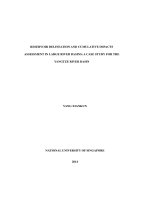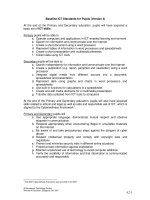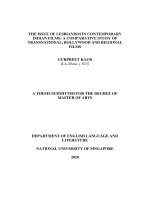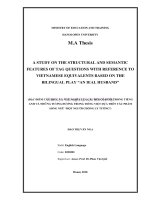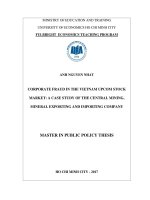- Trang chủ >>
- Luật >>
- Luật dân sự
A comperative study of the western and islamic concept of law
Bạn đang xem bản rút gọn của tài liệu. Xem và tải ngay bản đầy đủ của tài liệu tại đây (737.81 KB, 65 trang )
ﺑﺴﻢ ﷲ اﻟﺮﺣﻤﻦ اﻟﺮﺣﯿﻢ
ﻧﺤﻤﺪه و ﻧﺼﻠﯽ ﻋﻠﯽ ٰ رﺳﻮﻟہ اﻟﮑﺮﯾﻢ
A COMPARATIVE STUDY
OF THE WESTERN AND ISLAMIC
CONCEPT OF LAW
Justice ® Dr. Munir Ahmad Mughal
/>
Introduction
The object and purpose of comparative
study of any affair is to know which of
the two things to be compared is more in
the interest of mankind and promotes
human dignity. In doing so, first of all
each of the things to be compared is
Electronic
Electroniccopy
copyavailable
availableat:
at: /> />
defined, its sources are mentioned, its
theories are traced, and its kinds are
found. After doing that, similarities and
dissimilarities between the things
compared are pointed out.
In this lecture an effort has been made to
discuss all these matters concerning
Western and Islamic concepts of law as
briefly as possible, in the manner of
conducting research on standard
principles.
Etymology1 of the word “Law”
It is derived from old German word Lag
which came to English as Lagu and later
became Law. The inherent meaning in
this word is equality. However, it is used
1
Etymology means the study of the origin and
development of word. See Linguistics and Language, Julia
S. Falk, John Wiley and Sons, New York: 1978, p.49.
2
Electronic
Electroniccopy
copyavailable
availableat:
at: /> />
to convey the sense of settled rules and
regulations as no society can live an
organized life without laws. It is the law
that creates equality among the conduct
of individuals and thus renders them to
coexist in the same society. The
principles and rules appear in the form of
customs and usages the violation of
which results in social boycott. However
the laws of a State are distinct for the
reason that the State being sovereign, it
uses its power to enforce them and
compels the individuals to obey them
and punishes in case of violation of any
such law.
According to New Standard Dictionary
of English Language, Law is an
obligatory rule of action; specific., arule
of conduct prescribed by the supreme
3
Electronic copy available at: />
power in a state; a legislative enactment;
as the law of God and man.2
The following distribution of law is that
made by Wharton in his law lexicon:
Law
Between God and Man
Natural-Revealed
Law between Man and Man
National or Municipal- International
Constitutional-Canon or EcclesiasticalCommon Law-Equity.
Public or criminal- Private or Civil.3
2
Funk and Wagnalls, Niew Standar Dictionary of English
Langiage, Funk and Wagnalls Publishing Company, New
York: 1963, p. 1398. The first edition of this Dictionary
was published in 1913. It means a year less than a century
have passed but the glory and usefulness of this dictionary
has shined more and more. The reasons are many, of
which one is authenticity of data. [Justice Dr. Munir A.
Mughal].
3
Ibid. p.1399.
4
Electronic copy available at: />
Law is not necessary to avoid mutual
conflict or confrontation but it is equally
necessary for mutual cooperation and
social conveniences. A Law works for a
long time in a society that has in it the
full capacity to fulfil the social and moral
requirements. A law that is not in
harmony with the needs of the society or
is outdated becomes of no use.
Consequently, it is amended by the
competent legislature or repealed by a
repealing enactment.
5
Electronic copy available at: />
Definition4 of Law
According to Aristotle5:
Aristotle stated that “the rule of law . . .
is preferable to that of any individual.”
This is because individuals possess flaws
and could tailor government to their own
individual interests, whereas the rule of
law is objective.
[H]e who bids the law rule may be
deemed to bid God and Reason alone
rule, but he who bids man rule adds an
element of the beast; for desire is a wild
4
Definition is to gain clarity and precision regarding the
thing defined. Bryan A. Garner, A Dictionary of Modern
Legal Usage , 2nd ed. New York: Oxford University Press,
2003, p. 267
5
Aristotle was a Philosopher, born at Stagira, a Grecian
colony in the Thracian peninsula Chalcidice, 384 B.C.; died
at Chalcis, in Euboea, 322 B.C. CATHOLIC
ENCYCLOPEDIA: Aristotle
<www.newadvent.org › Catholic Encyclopedia › A>
6
Electronic copy available at: />
beast, and passion perverts the minds of
rulers, even when they are the best of
men. The law is reason unaffected by
desire.
Rulers must be “the servants of the
laws,” because “law is order, and good
law is good order.”6
In the glossary of Aristotle’s terms, the
word “nomos” is used for law.7
6
/>7
Glossary of Aristotelian Terms
action: praxis
citizen: politês
city-state: polis (also ‘city’ or ‘state’)
community: koinônia
constitution: politeia (also ‘regime’)
free: eleutheros
good: agathos
happiness: eudaimonia
happy: eudaimôn
7
Electronic copy available at: />
According to:
A law is generally collection of such
general rules and regulations which has
at its back a political support.8
According to Austin:
8
justice: dikaiosunê
law: nomos
lawgiver: nomothetês
master: despotês
nature: phusis
noble: kalon (also ‘beautiful’ or ‘fine’)
political: politikos (of, or pertaining to, the polis)
political science: politikê epistêmê
politician: politikos (also ‘statesman’)
practical: praktikos
practical wisdom: phronêsis
revolution: metabolê (also ‘change’)
right: exousia (also ‘liberty’)
ruler: archôn
self-sufficient: autarkês
sovereign: kurios
virtue: aretê (also ‘excellence’)
without qualification: haplôs (also ‘absolute’)
without authority: akuron
Everyman’s Encyclopaedia, Vol.8, p.379, London: 1978.
8
Electronic copy available at: />
Law is the will of a sovereign.9
According to Curzon:
Law is a set of regulation which is issued
from a sovereign and its obedience is
made binding on the subjects by the
sovereign.10
Distinguishing between Law and Ethics
Curzon said:
Oluwaseun P. Adeola in his article
contributed to Hubpages has written:
“Law has been defined by L.B Curzon as
the written and unwritten body of rules
largely derived from custom and formal
enactment which are recognized as
binding among those parsons who
constitute a community or state, so that
9
Siyasat-o-Riyasat, Faruq Najib Akhtar, Lahore: 1967, p.
181.
10
Jurisprudence, Curzon, London: 1979, p. 27.
9
Electronic copy available at: />
they will be imposed upon and enforce
among those persons by appropriate
sanctions. (p.209). it can be deduced
from the definition of L.B Curzon that
people within a sovereign geographical
enclave, through legitimate government,
impose set of rules upon themselves
which must be strictly adhered to. And
failure to live, act and /or transact
business on the basis of the recognized
law will result into appropriate
punishments.
Suffice to say, laws are not just
suggestions and expectations but are
requirements to behave in the stipulated
ways. As it is believed that government
makes the enactment and rules they also
see to ensuring that people live within
the dictates of the law. They achieve this
by using, for example, the police force to
enforce the recognized law of the land.
10
Electronic copy available at: />
Moreover, for the proper understanding
of the term law, I will briefly discuss the
essential characteristics of law as
outlined by Susan M. Anstead.
Consistent – it will be somewhat
difficult for people to adhere to
requirements that are contradictory. A
requirement is no law when it not
consistent
Universal – The requirements must
be applicable to everyone with similar
characteristics facing the same set of
circumstances.
Published – for a requirement to be
accessible to people, it must be
published in writing in the form that
everyone can have access to it.
Accepted – laws have to be generally and
utterly obeyed.
Enforced – Members of society must
be compelled to obey the law in the
11
Electronic copy available at: />
case they refuse l to choose to do so
voluntarily.
Traffic law is an example of what an
operational law is in our society today
and it encapsulates the five
characteristics aforementioned.
To maintain orderliness on the roads and
smooth running of the transport industry,
government enacts the traffic law which
every member of a society must abide
by. However, any contravention of the
law will attract fines and /or prosecution.
Therefore, one can see that the
importance of law cannot be over
emphasized.”11
According to Salmond:
11
/>12
Electronic copy available at: />
Law is a collection of regulations which
is accepted by the State and enforces
them to administer justice in the State.12
According to Catholic Encyclopaedia:
“Law - By law in the widest sense is
understood that exact guide, rule, or
authoritative standard by which a being
is moved to action or held back from it.
Law, Canon - Canon law is the body of
laws and regulations made by or adopted
by ecclesiastical authority, for the
government of the Christian organization
and its members
Law, Civil (Influence of the Church on) Christianity is essentially an ethical
religion; and, although its moral
principles were meant directly for the
elevation of the individual, still they
12
Jurisprudence, Sir John Salmond, London: 19--, p. 27.
13
Electronic copy available at: />
could not fail to exercise a powerful
influence on such a public institution as
law, the crystallized rule of human
conduct
Law, Common - The term is of English
origin and is used to describe the
juridical principles and general rules
regulating the possession, use and
inheritance of property and the conduct
of individuals, the origin of which is not
definitely known, which have been
observed since a remote period of
antiquity, and which are based upon
immemorial usages and the decisions of
the law courts as distinct from the lex
scripta; the latter consisting of imperial
or kingly edicts or express acts of
legislation
Law, Divine (Moral Aspect of) - That
which is enacted by God and made
known to man through revelation
14
Electronic copy available at: />
Law, International - Defined to be 'the
rules which determine the conduct of the
general body of civilized states in their
dealings with each other' (American and
English Encycl. of Law)
Law, Mosaic - The body of juridical,
moral, and ceremonial institutions, laws,
and decisions comprised in the last four
books of the Pentateuch, and ascribed by
Christian and Hebrew tradition to Moses
Law, Natural - In English this term is
frequently employed as equivalent to the
laws of nature, meaning the order which
governs the activities of the material
universe. Among the Roman jurists
natural law designated those instincts
and emotions common to man and the
lower animals, such as the instinct of
self-preservation and love of offspring
Law, Roman - This subject is briefly
15
Electronic copy available at: />
treated under the two heads of; I.
Principles; II. History.” 13
Sources of law
Like the state the law is also the product
of history. It has evolved with the
evolution of time. There is always a
power at the back of law. This power
may be religious or of the general masses
or the governmental or judicial or a view
of a jurist based on justice. Such power
serves as mint from where the public
opinion or any other opinion with the
support of the State with a stamp of the
sovereign who is at its back comes into
appearance. This organic movement of
law is the source of law. A law which is
prevalent in the society, due to its great
usefulness, people will feel convenience
to follow it and for this reason such law
13
/>16
Electronic copy available at: />
will remain enforced in the society.
When the circumstances change this law
will also change and amendment in it
will be inevitable. Those circumstances
that will cause such change will be the
sources of law.
Division of Sources of law according to
Salmond
Salmond has divided the sources of law
into Formal and Material. Then Material
source has been further divided into
historical and legal. Then legal source
has been further subdivided into
legislation, judicial precedents, customs
and usages and conventions or
agreements. Legislation is further
subdivided into Administrative, Judicial,
Colonial, Municipal, and Autonomous. 14
14
Ibid.
17
Electronic copy available at: />
Western Theories of Law
Theories of law are evolution of
historical process which has reached us
in developed forms. The principles of
law have reached us after centuries
ponder and observation. The fact is that
still there exists in these principles of law
a state of conflict and confrontation. To
show that conflict and confrontation the
experts in law have out forward a dozen
theories of which the most popular are
the following:
1. Natural Theory of Law;
2. Imperative Theory of Law;
3. Evolution Theory of Law;
4. Advantage Theory of Law.
18
Electronic copy available at: />
Kinds of Western Laws
Kinds of Western Law with regard to its
different references are as under:
(A) With reference to Legislation
laws are;
1. Constitutional Law;
2. Written law;
3. Ordinances promulgated during
emergency;
4. Customary laws;
5. Judicial precedents or Judge made
law; and
6. International Law.
(B) With reference to geography laws
are:
1. National law; and
2. International law.
19
Electronic copy available at: />
(C) With reference to function laws
are:
1. Personal law,
2. Common law,
3. Administrative law.
(D) With reference to crime laws
are:
1. Criminal law,
2. Civil Law
3. International law.
(E) With reference to Memory are:
1. Written law
2. Unwritten Law
(F) With reference to legislation
laws are:
1. Ordinance.
2. Act.
20
Electronic copy available at: />
Kinds of Law as stated by Salmond
1. Commanding Law,
2. Natural or Moral Law,
3. International law
4. Domestic law or the law of the
land,
5. Physical or scientific law,
6. Contractual law,
7. Customary law,
8. Law of Art;
9. General law,
10. Special Law,
11. Martial law.
Islamic Concept of Law
In Islam for law the word used is
Shari`at. Shari`at means “the Straight
Path/”اﻟﺼﺮاط اﻟﻤﺴﺘﻘﯿﻢ. All Muslims in all
their prayers recite the first chapter of the
21
Electronic copy available at: />
Holy Qur’an called Surah al-Fatihah. It
contains seven oft-repeated verses. It is
also called Surah Al-Hamd. In it they all
pray15 :“Show us the Straight Path”.
15
The full text and translation of Surah al-Fatihah is:
In the name of Allah, Most Gracious, Most Merciful.
1. Praise be to Allah, the Cherisher and Sustainer of the
worlds;
2. Most Gracious, Most Merciful;
3. Master of the Day of Judgment.
4. Thee do We worship, and Thine aid we seek.
5. Show us the straight way,
6..The way of those on whom Thou hast bestowed Thy
Grace,
7. Those whose (portion) is not wrath, and who go not
astray.
[1: 1 to 7]
22
Electronic copy available at: />
What is the Straight Path? The Holy
Qur’an has mentioned the Straight Path
in the following words:
All who obey Allah and the apostle are
In the company of those on whom is the
Grace of Allah, - of the prophets (Who
teach), the sincere (lovers of Truth), the
witnesses (Who testify), and the
righteous (Who do good): Ah! What a
beautiful fellowship!
[4:69]
23
Electronic copy available at: />
Its source is Divine Guidance.
It originated when first man on earth i.e.
Hadrat Adam (peace be upon him) was
sent. Adam was creation of God
Almighty. He was guided concerning all
such affairs that were necessary by God
Almighty by means of revelation. It
covered all walks of human life.
The event is mentioned in the Holy
Qur’an at various places:
24
Electronic copy available at: />
25
Electronic copy available at: />


